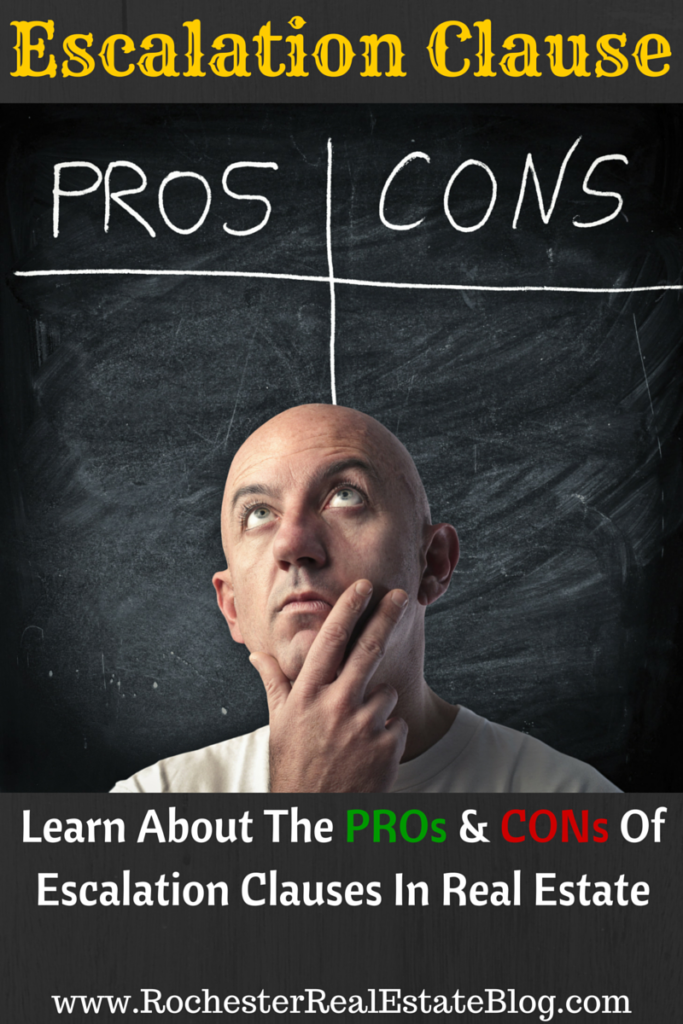What Is An Escalation Clause In Real Estate?
Have questions about buying or selling a home?
Ask Now!PROs And CONs Of An Escalation Clause In Real Estate

What Is An Escalation Clause In Real Estate – PROs and CONs Inside
Home buyers typically have a lot of different feelings, thoughts, and emotions throughout the home buying process. There are a lot of very important decisions that need to be made when buying a home.
Some of the decisions that a buyer needs to figure out or consult with their real estate agent about throughout the home buying process include;
- What type of mortgage is best for me?
- What real estate contingencies should I include in a purchase offer?
- How much should I offer for the home?
- What are the competing buyers thinking about this home?
These are just a few of the most common decisions and thoughts that a buyer will face when buying a home. When a buyer is attempting to buy a home in a sellers market, it can become even more convoluted. It’s important buyers who are buying a home in a sellers market know what to expect and also face the reality that they will be facing competition.
The Rochester real estate market is currently in the midst of a very strong sellers market, which is the case with many real estate markets across the country. Homes that are priced properly are having several dozen showings in the first 24 hours of being listed for sale and receiving several offers.
If you’re buying a home in a competitive real estate market, a term that you need to be aware of is an escalation clause. An escalation clause potentially can be the difference between a buyer getting the home of their dreams or not.
Read on to find out what an escalation clause is in real estate. You will also find out when it’s a good idea to include an escalation clause along with some of the benefits and drawbacks to an escalation clause.
What Is An Escalation Clause In Real Estate?
It’s rare that home buyers don’t have questions throughout the home buying process. In fact, there are many home buying questions that are asked on a regular basis. One real estate term that is not frequently asked about is an escalation clause.
An escalation clause in real estate, also referred to sometimes as an escalator clause, has actually existed for quite some time. It is an additional document or clause that can be included in a purchase offer that informs a seller that a buyer is willing to beat out competing offers. An escalation clause states that a buyer agrees to beat out competing offers by a specified dollar amount but not exceed a specified dollar amount.
For example, a buyer offers a seller $300,000 for their home and includes an escalation clause stating that if a higher offer is received, they would pay $2,000 more than the other offer up to $325,000. Therefore if the seller receives an offer for $320,000, the buyer is agreeing to pay $322,000 for the home. If an offer for $326,000 was received, the buyers escalation clause would not apply since the offer exceeded their maximum price.
It’s important that if you’re buying a home and are thinking about including an escalation clause with your offer that your real estate agent has experience understands how escalation clauses work. It’s imperative that your buyers agent includes in the escalation clause that higher offers must be verifiable, otherwise it’s possible a seller could attempt to get a higher price for their home even though they don’t have a higher offer. If you’re going to be buying a home in a sellers market where an escalation clause may be a good idea, as you think about interview questions to ask buyers agents, you may want to consider asking agents about their experience and understanding of escalation clauses.
When Should You Consider An Escalation Clause?

When Is An Escalation Clause A Good Idea
First and foremost, escalation clauses should not always be included when making an offer on a property. It’s possible that an escalation clause is not necessary for a buyer to secure the home they’re wanting to buy.
An escalation clause should however be considered when buying a home that has multiple offers. An escalation clause can give a buyer the opportunity to still have an opportunity to get a home in a multiple offer situation, even though they aren’t offering their maximum amount in their initial purchase offer.
The escalation clause is a great tool to protect a buyer from paying more for a home than is necessary. If there are no competing offers on a property, including an escalation clause is not necessary in the majority of situations.
Before including an escalation clause in a purchase offer, it’s helpful to first find out if the seller is willing to accept an escalation clause or not. It’s not always possible to find out if a seller is willing to accept offers with an escalation clause. Some sellers will not allow an escalation clause since they’d prefer that buyers put their highest and best offer in their first offer.
What Are The Benefits Of Including An Escalation Clause In A Purchase Offer?
The biggest benefit of including an escalation clause in a purchase offer is that it allows a buyer to not “overpay” for a home if no other offers are in play. Since a buyer still has the ability to beat out competing offers with an escalation clause, it may not be necessary that they pay the highest they are willing to go if the competing offers aren’t that high.
Another PRO of including an escalator clause in a purchase offer is that it gives a buyer “peace of mind” that they’ve offered the absolute highest amount they’d be willing to pay for a home. If a buyer doesn’t include an escalator clause and gets beat out by a competing offer but they were willing to go $5,000 higher, it is likely too late if a better offer has been accepted. An escalator clause guarantees that a buyer doesn’t leave a few thousand dollars out there that they would have been willing to pay for a specific home.
What Are The Negatives Of Including An Escalation Clause In A Purchase Offer?

Learn About The PROs & CONs Of Escalation Clauses In Real Estate
Since escalator clauses are not extremely common in real estate, one potential drawback of including an escalator clause is that the listing agent may not truly understand how it works. Recently while selling a home in Pittsford NY, an experienced agent had no idea how an escalator clause worked. This can create a problem if a listing agent doesn’t know how to explain an escalator clause to the seller. It can get even more confusing if there are multiple offers that have escalator clauses included and potentially a seller may just ignore them completely and review the offers that are more traditional, such as a highest and best offer.
Another potential negative to an escalator clause is that some sellers potentially could be turned off by them. It’s possible that a seller gets upset when an escalator clause is included because they feel that if the buyer is willing to pay up to a specified dollar, then why didn’t they offer that amount from the beginning.
Escalation clauses can also sometimes lead to bank appraisal problems. Since escalation clauses typically lead to a property selling for much higher than it’s list price, it can result in a home under appraising. This is clearly another CON of escalation clauses in purchase offers. It’s possible that appraisal problems may not be an issue if the appraiser is able to find supporting comparable sales.
Final Thoughts
As you can see from the above information, an escalation clause can potentially be a good idea to include in a purchase offer when buying a home. There are certainly many advantages to including an escalation clause as well as potential disadvantages. It’s important that your real estate agent understands escalation clauses.
Remember that always including an escalator clause is not necessary or recommended. If you’re buying a home, you should consult with your real estate agent to determine whether an escalator clause is needed or not.
Other Top Home Buying Resources
- Should You Use An Escalator Clause via About Home
- Top 10 Reasons Why Your Purchase Offer Was Rejected
- Making A Purchase Offer In Real Estate via Teresa Cowart
- How To Beat A Cash Real Estate Offer via Maximum Real Estate Exposure
Are you buying a home in Rochester NY? It’s very likely that in the current state of the real estate market you may potentially be facing competing offers. An escalation clause could possibly be the difference between you getting the Rochester NY home of your dreams or not. It’s important that you have a top Rochester real estate agent looking out for your best interests. If you haven’t hired a top Rochester NY real estate agent yet, contact me, and I’d love to talk with you about your real estate needs.
About the authors: The above article “What Is An Escalation Clause In Real Estate?” was provided by the Keith Hiscock Sold Team (Keith & Kyle Hiscock). With over 30 years combined experience, if you’re thinking of selling or buying, we’d love to share our knowledge and expertise.
We service the following Greater Rochester NY areas: Irondequoit, Webster, Penfield, Pittsford, Fairport, Brighton, Greece, Gates, Hilton, Brockport, Mendon, Henrietta, Perinton, Churchville, Scottsville, East Rochester, Rush, Honeoye Falls, Chili, and Victor NY.